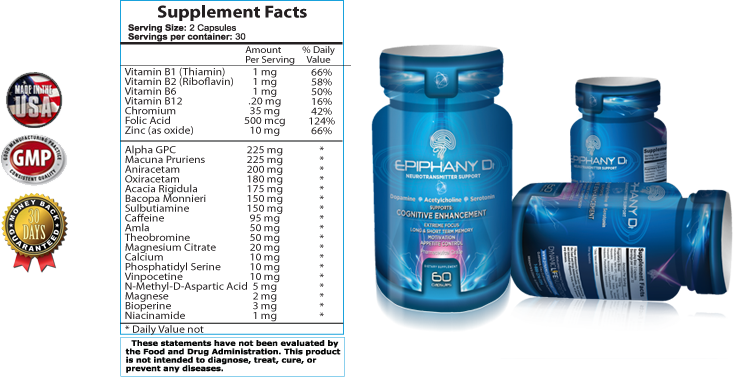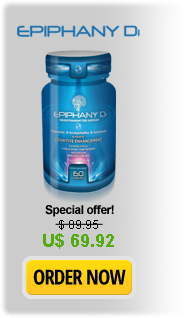


With the massive advancements in nutrition and Nootropics people now have the ability to fight back against the never ending demands of everyday life. Epiphany D1 was designed to balance focus with mental vigilance; this requires creative ingenuity inspired by analytical observation. Instead of tearing down the biochemistry of your brain (the real problem with prescription stimulants), Epiphany D1 is balanced, with moderate doses of a few synergistic brain-foods that work by providing the foundation for better structure and function of your brain. Epiphany D1 provides precursors for key neurotransmitters like dopamine, norepinephrine and acetylcholine. It puts them to use by improving blood flow to promote overall brain metabolism.

Epiphany D1 is used to enhance visual, auditory, and spatial thought processing within the brain during memory formation and optimize motor coordination between the brain and the rest of the body.
Structural and functional imaging research on the neurochemistry of ADHD implicate the catecholamine-rich fronto-subcortical systems in the pathophysiology of ADHD. Epiphany D1’s “stack” of Nootropics targets neurotransmitters allowing it to potentially help with symptoms of ADHD such as:
- Working memory and recall (holding facts in mind while manipulating information; accessing facts stored in long-term memory)
- Activation, arousal and effort (getting started; paying attention; completing work)
- Emotion control (tolerating frustration; thinking before acting or speaking)
- Internalizing language (using self-talk to control one's behavior and direct future actions)
- Complex problem solving (taking an issue apart, analyzing the pieces, reconstituting and organizing them into new ideas)
Nootropics, especially a stack like Epiphany D1 should be taken every day for the best results. In fact, many of its effects may become more pronounced as you continue on a strict regimen. This phenomenon is known as sensitization. Your body must become accustomed to certain Nootropics in Epiphany D1 in order for their effects to take flight. Epiphany D1 is the next generation in cognitive enhancement—the fact is, there’s no other like it. Nootropics bring about new possibilities and a new way of thinking for growing minds everywhere. Be a part of the movement. Make life worth remembering. View Epiphany D1’s ingredients to learn more on how Epiphany D1 works.
| » Pharmaceutical grade | » Mood stabilizer | » Faster processing | ||
| » No doctor visits | » Supports short and long-term | » Better organization | ||
| » No prescription | memory | » Enhanced motor skills | ||
| » Extreme focus | » Cognitive enhancement | » Better focus for reading | ||
| » Memory enhancement | » Brain protection | » Increased study habits | ||
| » Cleanse neurons | » Faster processing | » Confidence booster | ||
| » Enhanced problem solving | » Better organization | » Optimistic outlook | ||
| » May help appetite stabilization | » Clean energy, no jitters | » Promotes positive attitude |

Bacopa Monnieri
Bacopa Monnieri is the touted as the ‘Queen’ of Ayurveda owing to its performance enhancement qualities in tests measuring nervous tension, memory, and low mood. Bacopa is an adaptogen, neural protectant, and nervous system rejuvenant. It is one of the most highly validated nootropics and shows potential for cognitive improvements in healthy individuals. As an herb, Bacopa Monnieri contains: Bacoside A & B, Bacosterols, Bacosine, Brahmine, Luteolin, and Apigenin.
Acacia Rigdula
Acacia’s chemical profile includes phenethylamine (PEA) and other related compounds linked to increased mood and mental performance.
Aniracetam
Aniracetam (1-Anisoyl-2-pyrrolidinone) is a fat-soluble compound in the group of racetams due to its common pyrrolidone structure. Though it may offer benefits to stress Aniracetam acts as a positive modulator of AMPA receptors, and it may help prolong desired excitatory effects without causing excitotoxicity. Aniracetam is most known for its effects on working memory.
Oxiracetam
Oxiracetam (4-hydroxy-2-oxo-1-pyrrolidinacetamide) is a potent, fast acting, water-soluble compound. Many users claim it may be the fastest acting racetam. Oxiracetam is renowned as the “preferred Nootropic” for the elite smart drug user due to its therapeutic effects at small doses.
- Supports multiple aspects of Cognition
- Boosts Brain ATP levels (Mental Energy)
- Increase Choline Acetylcholinetranferase, the neuroenzyme that creates Acetylcholine
Amla (Indian Gooseberry)
Amla is an abundant source of Vitamin C, which aids in the synthesis of Norepinephrine, a neurotransmitter that helps maintain brain function and mood. Studies show it may help reduce levels of CRP (C-reactive protein) and fight free radicals. Indian Gooseberry helps the body detoxify carcinogens, boosts cancer-fighting NK (natural killer) cell activity, and helps to avoid DNA mutations caused by aluminum, lead, and chromium, and nickel.
Vinpocetine
Vinpocetine is a compound derived from vincamine, an alkaloid naturally occurring in Voacanga seeds. Vinpocetine supports brain metabolism by increasing cerebral synthesis of ATP, the universal “currency” of energy. Vinpocetine enhances brain metabolism by improving utilization of oxygen. Vinpocetine also modulates neurotransmitter release in areas of the brain associated with memory.
Macuna Pruriens
Mucuna pruriens contains a compound called L-DOPA, which is a direct precursor to the neurotransmitter dopamine. Dopamine works as one of the best natural HGH releasers (human growth hormone) by stimulating the pituitary gland to increase its production. Dopamine also increases other hormones associated with libido and sexual pleasure.
Alpha GPC
Alpha GPC is a natural physiological precursor to acetylcholine, a neurotransmitter involved in memory and other cognitive functions. Its high bioavailability allows for efficient absorption and penetration of the blood brain barrier. In the brain and other neural tissues, Alpha GPC becomes a constituent of cell membranes. Clinical studies have demonstrated that supplementation with Alpha GPC can increase the brain's synthesis of acetylcholine. In this way, it helps to support memory, cognitive function and mental acuity.
Sulbutiamine
Sulbutiamine is a fat-soluble form of Vitamin B1 (a.k.a. thiamine). It has been shown to facilitate wakefulness, improve long-term memory, enhance reaction time, help decrease anxiety, and promote overall resistance to stress. Several studies have shown that sulbutiamine may improve memory via potentiation of cholinergic, dopaminergic, and glutamatergic transmission. Sulbutiamine is thought to act through the up-regulation of the reticular activating system, which is the center of arousal and motivation in the brain.
Phosphatidylserine
Phosphatidylserine (PS) belongs to a type of fats called phospholipids and forms a major component of cell membranes, helping to repair cells and aiding their ability to communicate with one another. PS has a wide range of benefits including regulation of cortisol and positive effects on memory, mood, athletic recovery, and general well being.
Caffeine
Caffeine is perhaps the most widely used nootropic available with studies to validate its positive effects on cognitive function (attention, mood, and memory). Caffeine is a stimulant. It works on the nervous system at the site of a neurotransmitter called adenosine. This results in excitation of the central nervous system and increased mental/physical energy levels. Long-term use may help to ward off age-related mental disorders.
Theobromine
As a phosphodiesterase inhibitor, theobromine helps increase cAMP, a second messenger in many hormone and neurotransmitter-controlled metabolic systems.
N-Methyl-D-Aspartic Acid (NMDA)
NMDA is an amino acid derivative that acts as a specific agonist at the NMDA receptor mimicking the action of glutamate.
Bacopa Monnieri is the touted as the ‘Queen’ of Ayurveda owing to its performance enhancement qualities in tests measuring nervous tension, memory, and low mood. Bacopa is an adaptogen, neural protectant, and nervous system rejuvenant. It is one of the most highly validated nootropics and shows potential for cognitive improvements in healthy individuals. As an herb, Bacopa Monnieri contains: Bacoside A & B, Bacosterols, Bacosine, Brahmine, Luteolin, and Apigenin.
Acacia Rigdula
Acacia’s chemical profile includes phenethylamine (PEA) and other related compounds linked to increased mood and mental performance.
Aniracetam
Aniracetam (1-Anisoyl-2-pyrrolidinone) is a fat-soluble compound in the group of racetams due to its common pyrrolidone structure. Though it may offer benefits to stress Aniracetam acts as a positive modulator of AMPA receptors, and it may help prolong desired excitatory effects without causing excitotoxicity. Aniracetam is most known for its effects on working memory.
Oxiracetam
Oxiracetam (4-hydroxy-2-oxo-1-pyrrolidinacetamide) is a potent, fast acting, water-soluble compound. Many users claim it may be the fastest acting racetam. Oxiracetam is renowned as the “preferred Nootropic” for the elite smart drug user due to its therapeutic effects at small doses.
- Supports multiple aspects of Cognition
- Boosts Brain ATP levels (Mental Energy)
- Increase Choline Acetylcholinetranferase, the neuroenzyme that creates Acetylcholine
Amla (Indian Gooseberry)
Amla is an abundant source of Vitamin C, which aids in the synthesis of Norepinephrine, a neurotransmitter that helps maintain brain function and mood. Studies show it may help reduce levels of CRP (C-reactive protein) and fight free radicals. Indian Gooseberry helps the body detoxify carcinogens, boosts cancer-fighting NK (natural killer) cell activity, and helps to avoid DNA mutations caused by aluminum, lead, and chromium, and nickel.
Vinpocetine
Vinpocetine is a compound derived from vincamine, an alkaloid naturally occurring in Voacanga seeds. Vinpocetine supports brain metabolism by increasing cerebral synthesis of ATP, the universal “currency” of energy. Vinpocetine enhances brain metabolism by improving utilization of oxygen. Vinpocetine also modulates neurotransmitter release in areas of the brain associated with memory.
Macuna Pruriens
Mucuna pruriens contains a compound called L-DOPA, which is a direct precursor to the neurotransmitter dopamine. Dopamine works as one of the best natural HGH releasers (human growth hormone) by stimulating the pituitary gland to increase its production. Dopamine also increases other hormones associated with libido and sexual pleasure.
Alpha GPC
Alpha GPC is a natural physiological precursor to acetylcholine, a neurotransmitter involved in memory and other cognitive functions. Its high bioavailability allows for efficient absorption and penetration of the blood brain barrier. In the brain and other neural tissues, Alpha GPC becomes a constituent of cell membranes. Clinical studies have demonstrated that supplementation with Alpha GPC can increase the brain's synthesis of acetylcholine. In this way, it helps to support memory, cognitive function and mental acuity.
Sulbutiamine
Sulbutiamine is a fat-soluble form of Vitamin B1 (a.k.a. thiamine). It has been shown to facilitate wakefulness, improve long-term memory, enhance reaction time, help decrease anxiety, and promote overall resistance to stress. Several studies have shown that sulbutiamine may improve memory via potentiation of cholinergic, dopaminergic, and glutamatergic transmission. Sulbutiamine is thought to act through the up-regulation of the reticular activating system, which is the center of arousal and motivation in the brain.
Phosphatidylserine
Phosphatidylserine (PS) belongs to a type of fats called phospholipids and forms a major component of cell membranes, helping to repair cells and aiding their ability to communicate with one another. PS has a wide range of benefits including regulation of cortisol and positive effects on memory, mood, athletic recovery, and general well being.
Caffeine
Caffeine is perhaps the most widely used nootropic available with studies to validate its positive effects on cognitive function (attention, mood, and memory). Caffeine is a stimulant. It works on the nervous system at the site of a neurotransmitter called adenosine. This results in excitation of the central nervous system and increased mental/physical energy levels. Long-term use may help to ward off age-related mental disorders.
Theobromine
As a phosphodiesterase inhibitor, theobromine helps increase cAMP, a second messenger in many hormone and neurotransmitter-controlled metabolic systems.
N-Methyl-D-Aspartic Acid (NMDA)
NMDA is an amino acid derivative that acts as a specific agonist at the NMDA receptor mimicking the action of glutamate.

